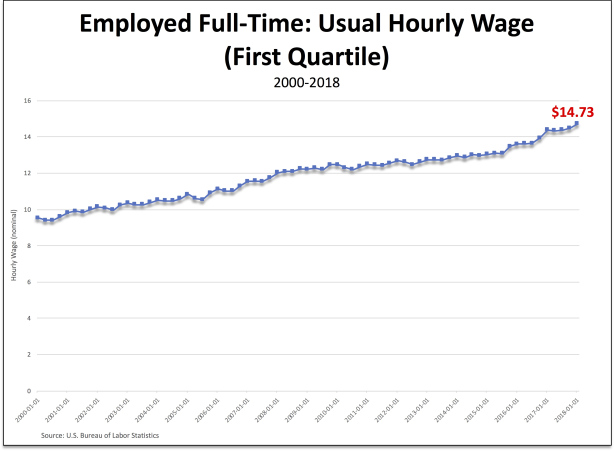From David Ruccio The usual suspects have attacked Bernie Sanders’s proposal for the federal government to guarantee a job paying an hour and health-care benefits to every American worker “who wants or needs one.” According to Robert J. Samuelson, “The proposal would add to already swollen federal budget deficits. . .Then there’s inflation. The extra spending and higher wages might push prices upward.” After listing a number of other “unavoidable” problems, Samuelson concludes: Americans are suckers for great crusades that make the world safe for the pursuit of happiness. In this context, Sanders’s job guarantee seems a masterstroke. The chronically unemployed need jobs; and states and localities have large unmet needs for public and quasi-public services. It’s a bargain made in
Topics:
David F. Ruccio considers the following as important: Uncategorized
This could be interesting, too:
tom writes The Ukraine war and Europe’s deepening march of folly
Stavros Mavroudeas writes CfP of Marxist Macroeconomic Modelling workgroup – 18th WAPE Forum, Istanbul August 6-8, 2025
Lars Pålsson Syll writes The pretence-of-knowledge syndrome
Dean Baker writes Crypto and Donald Trump’s strategic baseball card reserve
from David Ruccio
The usual suspects have attacked Bernie Sanders’s proposal for the federal government to guarantee a job paying $15 an hour and health-care benefits to every American worker “who wants or needs one.”
According to Robert J. Samuelson, “The proposal would add to already swollen federal budget deficits. . .Then there’s inflation. The extra spending and higher wages might push prices upward.”
After listing a number of other “unavoidable” problems, Samuelson concludes:
Americans are suckers for great crusades that make the world safe for the pursuit of happiness. In this context, Sanders’s job guarantee seems a masterstroke. The chronically unemployed need jobs; and states and localities have large unmet needs for public and quasi-public services. It’s a bargain made in heaven.
Back here on Earth, the collaboration looks less noble. The object is to appear good and buy political support. Many of the suggested jobs seem best described as make-work. The irony is that, by assigning government tasks likely to fail, the advocates of activist government bring government into disrepute.
And here’s Ed Rogers:
Democrats want to talk about Republicans living in the past, but the new progressives, as they like to call themselves, are in fact a lot like the old socialists. They want free college, free cash, free health care, new mandates for this and that, and so on. The latest progressive policy du jour to be gaining traction among Democratic Party presidential hopefuls is the so-called “job guarantee.”
What they have in common, in addition to the usual red-blooded American red-baiting, is they both cite a liberal critic of the Sanders proposal, Mother Jones blogger Kevin Drum:
even our lefty comrades in social democratic Europe don’t guarantee jobs for everyone. It would cost a fortune; it would massively disrupt the private labor market; it would almost certainly tank productivity; and it’s unlikely in the extreme that the millions of workers in this program could ever be made fully competent at their jobs.
Let’s face it, Drum is right. The proposal would cost a fortune; it would massively disrupt the private labor market; it almost certainly would lower the official level of productivity; and millions of workers would probably never be fully competent at their jobs.
But that’s only because of how bad things are for workers in the United States right now. According to my calculations (illustrated in the chart at the top of the post), a quarter of full-time American workers currently earn less than $15 an hour. We’re talking about something on the order of 32 million people. And that’s not even counting part-time and unemployed workers. Plus all the workers, whether or not they currently have a low-paying job, who have costly or substandard health insurance.
Employing all those people—at $15 an hour, with medical benefits—would cost a fortune. But not employing them at decent wages already costs the United States a fortune, in individual and social costs. Moreover, there’s no doubt that, if people had a good shot at a federally funded job, they’d be more able to refuse the paltry pay and the indecent kinds of jobs private employers are currently offering. And workers on a federal jobs program might not achieve high levels of productivity—but they would be doing jobs, to repair the economic and social infrastructure, most people would benefit from. Finally, such workers might never become fully competent at their jobs. However, they would develop competencies above and beyond what they can manage to acquire when they’re unemployed or underemployed at their current low-paying jobs.
What Drum and others think is a hard-headed, realistic criticism of a job guarantee turns out to be a stinging indictment of American capitalism itself. The fact that there are “50 million people who would be better off with a government-guaranteed job than with the job they have now” calls into question the way the U.S. economy is currently organized.
That’s what’s really insane—sticking with the existing labor market, not the idea of proposing a Federal jobs program.

